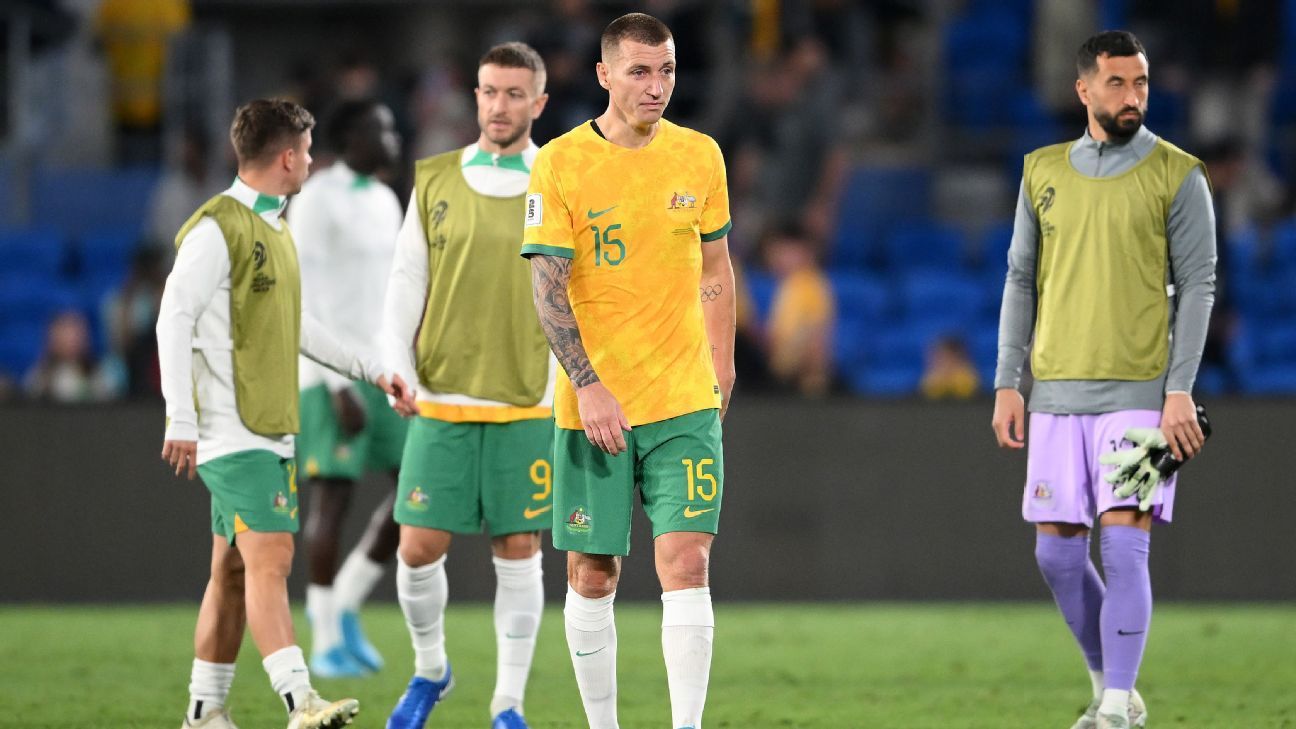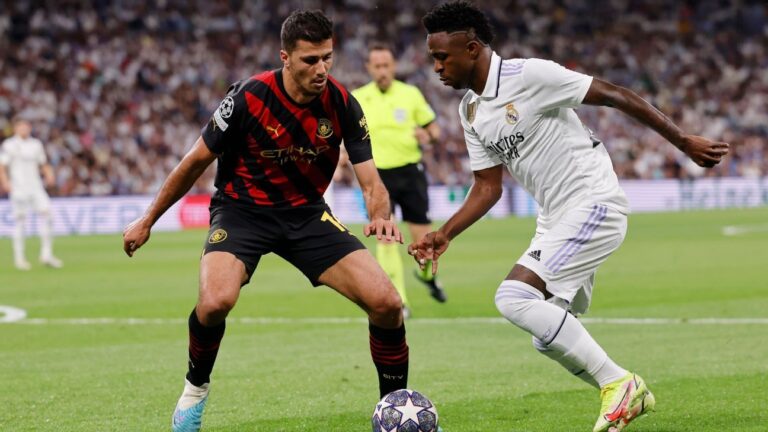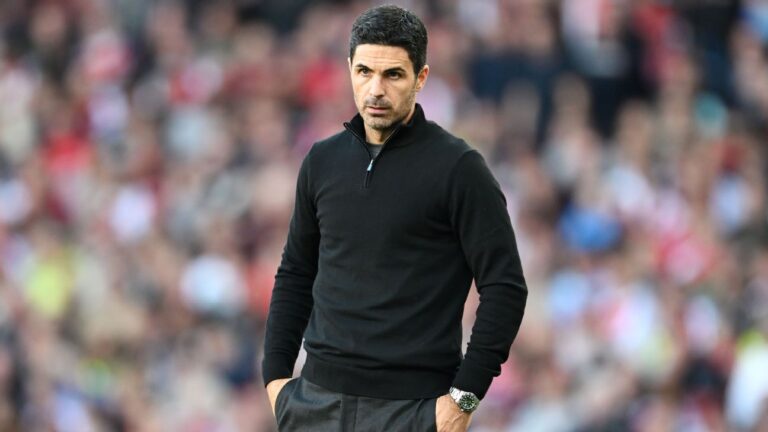GOLD COAST, Australia – It was another one of those paradoxical nights in Australian football. An evening that managed to somehow be simultaneously historic and maddeningly familiar at the same time – the dust thrown up by the Socceroos’ 1-0 loss to Bahrain set to settle on well-worn conundrums and ideological battles that have long been waged. And yet again, the question, as ever, is if this will elicit a reaction that will stir Australian football from the almost Promethean-like existence of crisis, giving way to renewal, giving way to hope, giving way to crisis yet again.
In what was a first-ever competitive Socceroo fixture on the Gold Coast, Australia’s men fell to just their second defeat in a home World Cup qualifier with actual stakes attached to it since 1981. Bahrain coach Dragan Talajić, in the most complimentary way possible, orchestrating a smash-and-grab operation that saw his side hold out, frustrate, and stymie their opponents before an 89th-minute own goal from Harry Souttar delivered Ghawaseen Al-Lulu a first victory over Australia in what was their seventh attempt. The rapturous celebrations from the Bahraini dugout when referee Omar al-Ali blew the final whistle demonstrated just what the result meant for the visitors, whose hopes of a debut World Cup appearance have been boosted by the tournament’s expansion to 48 sides. Their buoyant coach remarked in a deep baritone post-game that “The Golden City will always be remembered in my mind.”
Editor’s Picks
But if the opening game of the third phase of Asian qualification will be one that will be fondly remembered in Manama, it will be one that those in Green and Gold will be eager to forget. Because based on the record books alone – Australian sides just don’t lose these kinds of games at home, or at least they’re not supposed to – it was an historically bad night for the Socceroos.
Yet again when asked to take the initiative and break down a stubborn underdog, Australia failed to turn an abundance of possession into anything resembling meaningful attacks on the goal of Ebrahim Lutfalla, with the likes of Jackson Irvine and Maty Ryan lamenting how little their side had forced the Bahraini keeper to work in the aftermath of the defeat. By halftime, Australia had controlled 70% of possession but had only been able to produce a single shot on target – the same number as Bahrain. By the time the 90 minutes expired, that possessional dominance had increased and a further three shots on target were sent in but there had never been any real sense that the scoreboard was under threat – Kusini Yengi’s wayward volley from a Craig Goodwin cross that came upon him in a flash just before halftime as good as it got.
With a trio of Irvine, Connor Metcalfe, and Aiden O’Neill preferred by Arnold – none of whom count receiving and moving the ball forward in compact spaces in the middle of the pitch amongst their major strengths – the threat from the midfield was largely blunt and while there were attempts to drag the defence out of shape with diagonal balls, interplay on the flanks and opening up of space behind Yengi for others to run into (before his red card), the Bahranis were too deep and well-disciplined – and the ball movement not quick enough – to forge openings that would lead to high-quality chances. In the end, as is so often the case, set pieces quickly became the most likely avenue to goal but on this occasion they failed to find their mark.
“Not good enough, obviously,” remarked Ryan. “I felt like we were too naive in the way we played the game. I don’t think it’s a case of needing to work harder but needing to work smarter; we didn’t ask enough of the right questions in the right areas.”
Indeed, much was made postgame of the time-wasting and gamesmanship tactics of the Bahranis but, ultimately, they worked: multiple VAR checks and stoppages of play serving to disrupt any nascent momentum the Socceroos built and inducing errors in skill and judgement as frustration increasingly set in. And on this, the Australian skipper is correct: the most effective way to stop an opponent from wasting time isn’t to get frustrated but, instead, to alter the game state into one in which they no longer glean an advantage from doing so – take the lead, in other words – and ultimately the Socceroos failed to do that. Talajić’s side didn’t come to Australia to win in a manner that would make the Gold Coast crowd happy, they simply came to win. And the Croatian’s plan worked better than Arnold’s.
“They obviously parked the bus, and they had six at the back, and they had numbers,” said the Australia coach.
Australia’s Mitchell Duke looks on in disappointment after his side’s World Cup Qualifier loss to Bahrain on the Gold Coast, September 5, 2024 Matt Roberts/Getty Images
“Hopefully, you see that Bahrain is physically, a big, strong team. That was one of the things that we always had over those types of nations. But the creativity is down… I think we’ve got the quality, the quality is there, but you’ve got to give credit to Bahrain.”
However, while the result may mark a low point, few who watched the game or absorbed the washup will likely be surprised by how it was delivered. Indeed, while the result was one of the worst for the Socceroos in recent times, the performance itself wasn’t of the sort that would mark some kind of new nadir for the side: the issues of breaking down opponents, creating high-quality chances, and putting games to bed have haunted not just the Socceroos for several years but Australian sides in general – seniors and juniors, men’s and women’s – for quite some time. It wasn’t some kind of aberration but, instead, as Yogi Berra once said, déjà vu all over again.
In previous games, however, bounces or moments of fortune have gone the Socceroos’ way and ensured that the scoreline would provide some level of favour. This time around, however, the bounces favoured Bahrain – the one off Souttar’s leg in particular – which has served to shift the tone of the conversation. Football has a way of correcting itself like that.
“I know you guys love carrying on about breaking down teams. You’ve got to respect the opposition with their defence,” Arnold said.
Nestory Irakunda exchanges words with Bahrain players during Australia’s 1-0 defeat in their World Cup Qualifier on the Gold Coast, September 5, 2024 Matt Roberts/Getty Images
“I think they prepared very well. They’ve been here for 10 days, and you could see physically, they were ready for us. It was just one of those nights where, when we did have the occasions, we didn’t put the ball in the back of the net. We’ve learnt from past years, we need to do that.”
And it does need acknowledgement that Arnold is correct that players need to take their chances in these kinds of games against packed defences; Irvine spoke of some “harsh truths” that were shared amongst the players in the dressing room following the game. And Arnold is also accurate concerning the work that Talajić, his staff, and his players put in before and during the game. They did a fantastic job.
The question moving forward, however, is what kind of response this result elicits. As it’s also correct that figuring out how to break down these stubborn low blocks and put his players in positions to win these games is, ultimately, Arnold’s job.
On paper, this Socceroos side is one of the best teams in Asia. But while this has invariably been demonstrated during the earlier phases of qualification against the likes of Nepal, Bangladesh, and Taiwan, stiffer opposition in the later rounds has consistently been able to find ways to take points off Australia. They don’t tend to be remembered like the 2-0 defeat against Japan in Sydney in 2022 – when Football Australia itself began leaking against Arnold as qualification looked like it was slipping away – but it’s games like Wednesdays, or games like the 1-1 draw against China and 2-2 stalemate with Oman in the last cycle, that can define campaigns; the games that you’re supposed to be winning if you’re a side with the ambitions and internal expectations of the Socceroos.
Indonesia in Jakarta next Tuesday represents another one of those fixtures. And it can’t be taken for granted. Australia defeated Shin Tae-yong’s side 4-0 at the Asian Cup in December but since then, it’s young unit, consistently being bolstered by its diaspora, has grown. Hours after the Socceroos’ loss on Wednesday, they marched into Jeddah, took a lead and ultimately secured a point of another group heavyweight in Saudi Arabia – with only 34% of the ball.
Should the Socceroos meet this challenge and secure the three points – even if the underlying performance is largely similar – the narrative will likely shift again, with a home fixture against China and an away trip to Japan (in which expectations will be lower) coming next month.
Lose, however, and this sense of déjà vu will begin to take on more of a sense of dread.







